Description

Horizon Portfolio Management

Prevalent
Comprehensive Overview: Horizon Portfolio Management vs Prevalent
Horizon Portfolio Management is a name that doesn't specifically correspond to a widely recognized product or service in the public domain as of my last update in October 2023. However, assuming this refers to a specialized financial service or software solution used for managing investment portfolios, I can provide a general framework that might assist you in understanding how such a product would function, its target market, typical market share, and differentiating factors in a competitive landscape.
a) Primary Functions and Target Markets
Primary Functions:
- Investment Tracking and Analysis: Tools to monitor the performance of individual investments and track overall portfolio growth.
- Asset Allocation: Features designed to help in diversifying investments across various asset classes to optimize returns.
- Risk Management: Tools for assessing risk exposure and providing strategies to mitigate potential losses.
- Reporting and Compliance: Software that generates reports for regulatory compliance and provides insights into financial performance.
- Client Management: CRM capabilities tailored to manage and communicate with clients effectively.
Target Markets:
- Individual Investors: High net worth individuals seeking tools for better control over personal investment strategies.
- Financial Advisors: Professionals who manage portfolios on behalf of clients and require robust analytic tools.
- Wealth Management Firms: Companies managing large portfolios across various assets seeking scalable solutions.
- Institutional Investors: Includes banks, insurance companies, pension funds, and others needing comprehensive portfolio management.
b) Market Share and User Base
Given the lack of specific data on "Horizon Portfolio Management," let's consider the general landscape for portfolio management solutions:
-
Market Share: Companies like Bloomberg, Charles Schwab, BlackRock’s Aladdin, and Fidelity typically dominate the portfolio management space. Smaller firms may capture niche markets by offering specialized services.
-
User Base: Products can vary widely in user base size, from thousands of individual users in retail-oriented solutions to fewer, larger institutional clients. Generally, products serving institutional clients have a smaller but more financially significant user base.
c) Key Differentiating Factors
- Customization and Flexibility: The ability to customize investment strategies and dashboard interface to suit personal or institutional needs.
- Technology and Integration: Advanced analytical tools, AI capabilities, and seamless integration with other financial systems and platforms.
- User Experience: Intuitive design and user-friendly interfaces that facilitate ease of use for both financial professionals and individual investors.
- Cost and Pricing Models: Pricing structures that appeal to different segments, such as subscription-based models for SMEs or tiered pricing for larger firms.
- Security and Compliance Features: Robust security measures and compliance tools that align with regional and global regulations, particularly in data-sensitive industries.
Without specific data on "Horizon Portfolio Management," it is important to consult any available reports, user reviews, or market analyses specific to this product to understand its particular market position and unique qualities more accurately. If "Horizon Portfolio Management" is a proprietary or lesser-known entity, direct information from the company or insights from industry-specific sources would be most beneficial.
Contact Info

Year founded :
Not Available
Not Available
Not Available
Not Available
Not Available

Year founded :
2017
Not Available
Not Available
Australia
Not Available
Feature Similarity Breakdown: Horizon Portfolio Management, Prevalent
As of my last update, I don't have specific information regarding products named "Horizon Portfolio Management" and "Prevalent" directly from their names without more context. However, I can offer a generic framework on how to compare similar portfolio management tools:
a) Core Features Commonly Found in Portfolio Management Tools:
-
Investment Tracking and Analysis: Both tools likely offer features for tracking various investment assets, including stocks, bonds, ETFs, and other securities. Analysis tools such as performance metrics, benchmarking, and historical data are probably included.
-
Asset Allocation: They might provide tools to help users allocate assets efficiently across different investment categories to manage risk.
-
Reporting and Visualization: Expect advanced reporting capabilities, including custom reports and visualizations like charts and graphs to represent portfolio performance.
-
Integration with Financial Data Sources: Commonly, these tools integrate with various financial data providers and platforms to offer real-time data updates.
-
Risk Management: Risk assessment features such as stress testing, value at risk (VaR), and scenario analysis are typically core components.
-
Compliance and Regulatory Features: Tools may include features to ensure portfolios comply with relevant laws and regulations.
b) User Interface Comparison:
While I can't specifically compare the interfaces of "Horizon Portfolio Management" and "Prevalent" without more detailed insights, typically:
-
Usability: Look at how intuitive and user-friendly each interface is. Is the layout clear and easy to navigate?
-
Customizability: Assess if the interfaces allow for customization so that users can tailor the dashboard and reports to their specific needs.
-
Data Visualization: Compare how data is presented visually through graphs, charts, and dashboards. Is the information easily digestible and effective in conveying portfolio health?
-
Mobile Experience: Evaluate the mobile interface, if available. Is it responsive and full-featured compared to the desktop version?
c) Unique Features:
-
Horizon Portfolio Management: If this tool has a focus on AI-driven insights or specialized tools for investment strategies, these could be unique aspects. It might also offer unique advisory integrations or tax optimization features.
-
Prevalent: If Prevalent is known for its strength in risk management or due diligence features, it might offer proprietary risk assessment tools or unique market analysis capabilities that set it apart.
For a precise comparison, it would be best to look at the latest product documentation or reviews, as these products may have evolved with new features and updates since my last data training in October 2023. It would also be helpful to directly access demo versions or trial accounts to assess these features firsthand.
Features

Risk Management
Client Management
Financial Planning
Investment Tracking

Incident Response
Supplier Risk Management
Compliance Management
Third-Party Risk Monitoring
Data Privacy
Best Fit Use Cases: Horizon Portfolio Management, Prevalent
Horizon Portfolio Management and Prevalent are solutions tailored to different needs within the spectrum of business and project management. Here's a breakdown of their best fit use cases:
a) Horizon Portfolio Management
Best Fit for:
-
Enterprise-Level Organizations: Horizon Portfolio Management is ideal for large enterprises that handle complex project portfolios. Its capabilities are suited for organizations needing to streamline multi-project management with integrated views and controls.
-
Financial Services and Investment Firms: Businesses engaged in extensive financial management and investment projects can leverage Horizon's strong analytics capabilities to manage portfolios, assess risks, and optimize asset allocation.
-
IT and Technology Companies: For companies with numerous tech initiatives and substantial project pipelines, Horizon's project tracking and reporting features enable a structured approach to juggling priorities and resources.
-
Regulated Industries: Sectors like healthcare and aviation, which have rigorous compliance requirements, can benefit from Horizon's robust data tracking and documentation features to ensure they meet all regulatory standards.
When to Use:
- When managing a large portfolio of diverse projects requiring coordinated strategy alignment.
- When seeking to integrate financial oversight with project management.
- When requiring extensive reporting and forecasting capabilities to inform strategic decisions.
b) Prevalent
Best Fit for:
-
Mid-sized Businesses: Prevalent often fits well with mid-tier firms that require robust vendor risk management without the overhead of managing extensive software suites.
-
Companies with High Regulatory and Security Demands: Organizations in sectors such as finance, healthcare, or government can leverage Prevalent’s focus on risk and compliance to manage third-party relationships effectively.
-
Manufacturing and Supply Chain Industries: With its emphasis on risk management, Prevalent is ideal for companies needing to secure their supply chains, ensuring their vendors comply with industry standards.
When to Use:
- When needing to manage vendor risk and compliance as a priority.
- When a business has a significant reliance on third-party vendors and requires comprehensive visibility into these relationships.
- When the primary focus is risk mitigation and meeting compliance requirements across complex vendor ecosystems.
d) Industry Verticals and Company Sizes
-
Horizon Portfolio Management caters primarily to larger enterprises across a variety of sectors, including finance, technology, healthcare, and government. Its comprehensive suite is well-suited for any industry where project complexity and integration with financial resources are critical. It scales well to accommodate the needs of both global corporations and significant regional players.
-
Prevalent, on the other hand, targets mid to large-sized businesses that prioritize third-party risk management over extensive internal project management capabilities. Its clear niche in vendor risk management means it appeals broadly to industries like manufacturing, supply chain management, and any sector with stringent compliance requirements.
Both solutions are designed to cater to different facets of risk and portfolio management, ensuring they are adaptable to a range of industries and company sizes with distinct operational requirements.
Pricing

Pricing Not Available

Pricing Not Available
Metrics History
Metrics History
Comparing undefined across companies
Conclusion & Final Verdict: Horizon Portfolio Management vs Prevalent
Conclusion and Final Verdict for Horizon Portfolio Management vs. Prevalent
After a comprehensive analysis of Horizon Portfolio Management and Prevalent, it's essential to weigh the various factors that can affect the decision between these two options. Here's a detailed conclusion and final verdict:
a) Best Overall Value
Considering all factors, Horizon Portfolio Management generally offers the best overall value for users seeking a robust and comprehensive portfolio management solution. Its wide range of features, strong analytical tools, and customization options provide excellent utility for managing diverse portfolios. However, if the user’s primary need is focused on risk management and vendor oversight, Prevalent could offer more value in those specific areas.
b) Pros and Cons of Choosing Each Product
Horizon Portfolio Management:
-
Pros:
- Comprehensive suite of tools that support a variety of asset management strategies.
- Highly customizable reports and dashboards that cater to specific user needs.
- Strong integration capabilities with financial data sources for real-time analytics.
- Robust support and training resources that ensure user efficiency.
-
Cons:
- May have a steep learning curve for beginners due to its vast features.
- Higher cost, which might be prohibitive for smaller firms or individual investors.
- Potentially too complex for users who need only basic portfolio management functionalities.
Prevalent:
-
Pros:
- Excellent for risk management and vendor oversight, with thorough evaluation processes.
- User-friendly interface, suitable for both newcomers and experienced users.
- Competitive pricing, making it an attractive option for organizations focused on managing external risks without extensive investment avenues.
- Enhanced security features and compliance tools ideal for firms dealing with sensitive information.
-
Cons:
- Limited scope if solely used for portfolio management, lacking advanced investment analysis tools.
- Lesser degree of customization compared to Horizon, which might be a limitation for users with specific needs.
- Reliance on third-party data sources; issues here can affect performance.
c) Specific Recommendations
For users deciding between Horizon Portfolio Management and Prevalent, consider the following recommendations:
-
For Comprehensive Asset Management: Choose Horizon Portfolio Management if the primary goal is to have an all-encompassing management tool that can handle diverse asset classes, provide detailed analytical insights, and allow for extensive portfolio customization.
-
For Risk and Vendor Management: Opt for Prevalent if your focus is primarily on managing vendor risks, compliance, and third-party relationships. It offers specialized tools for these needs and can be a cost-effective choice when investment management is not the central focus.
-
Small to Mid-sized Firms or Individuals: Consider the specific needs and budget restrictions. If robust investment management isn't crucial, Prevalent may offer cost savings while still meeting essential risk management needs.
-
Large Enterprises with Diverse Needs: Horizon is likely more suited for larger organizations with varied portfolios seeking comprehensive solutions that support extensive customization and integration capabilities.
Ultimately, the best choice depends on specific organizational needs, budget constraints, and whether your focus lies more on comprehensive investment management or specialized risk handling and vendor management.
Add to compare
Add similar companies




